一般将来时讲解
般将来时时态用法讲解

一般将来时时态1. 一般将来时的定义一般将来时表示在现在看来即将要发生的动作或存在的状态。
常用时间副词tomorrow, soon 或短语next year / week / month, in a few days, in the future, sometime 做状语。
如:What will you do this afternoon 你今天下午干什么?We will have a meeting tomorrow. 我们明天要开会。
He is going to study abroad(到国外) next year. 明年他要出国学习。
2. 一般将来时的结构及应用(1) shall / will + 动词原形。
表示即将发生的动作或存在的状态。
特别是表示客观性的事情或在某条件下要发生的事情,只能用此结构。
如:What shall we do if he doesn’t come 如果他不来,我们该怎么办?Will you be free this evening 今天晚上有空吗?I think he will tell us the truth(真相)。
我想他会告诉我们真实情况的。
(2) be going to + 动词原形。
表示已经计划或安排好了的事情,也可表示有迹象表明肯定要发生的事情。
如:We are going to have a meeting to discuss (讨论)the matter this evening. 今天晚上开会讨论这件事情。
Look at the black clouds over there. I think it is going to rain soon. 看一看那边的乌云,我想天要下雨了。
There is going to be an English evening this week. 本周要举行一个英语晚会。
(3) be +现在分词。
表示即将发生的动作或存在的状态。
初中数学一般将来时专项语法讲解

初中数学一般将来时专项语法讲解一般将来时是表示将来某个时间要发生的动作或事件。
在初中数学中,很多时候我们需要描述将要发生的事情,使用一般将来时就尤为重要了。
I. 构成方法一般将来时由“will/shall + 动词原形”构成。
其中 shall 用得较少,will 是最主要的情态动词。
例如:I will go to school tomorrow.陈述句否定句构成如下:陈述句:I will see you tomorrow.否定句:I will not see you tomorrow.疑问句构成如下:一般疑问:Will you see me tomorrow?(肯定回答:Yes, I will.否定回答: No, I won't.)特殊疑问:What will you do tomorrow? (回答:I will go to school.)II. 动词用法将来时态只是时间状语,用途相当于陈述一件在未来某个时间会发生的事情,如“明天”,“下周”等。
* 表示未来的计划或决定:I will travel next month.* 表示意愿或承诺:I will help you with your homework.* 表示在未来一段时间内会经常发生的动作、或在未来发生的动作是一种惯:He will play basketball every morning.* 表示未来某个时间衔接发生的动作:I will wake up, and then I will brush my teeth.* 表示偶然发生的事情:There will be a party at my friend's house tomorrow.III. 练题1. 我明天早上6点起床。
2. 他下下个月去伦敦。
3. 他会在这个周末打篮球。
4. 我会帮你研究数学。
5. 当你到机场时,我会等你的。
答案:1. I will wake up at 6 tomorrow morning.2. He will go to London next month.3. He will play basketball this weekend.4. I will help you with studying mathematics.5. I will wait for you when you arrive at the airport.初中数学一般将来时是数学学习中的重要部分,希望这份语法讲解能帮助学生更好地掌握此知识点。
初二英语语法分析--一般将来时用法讲解
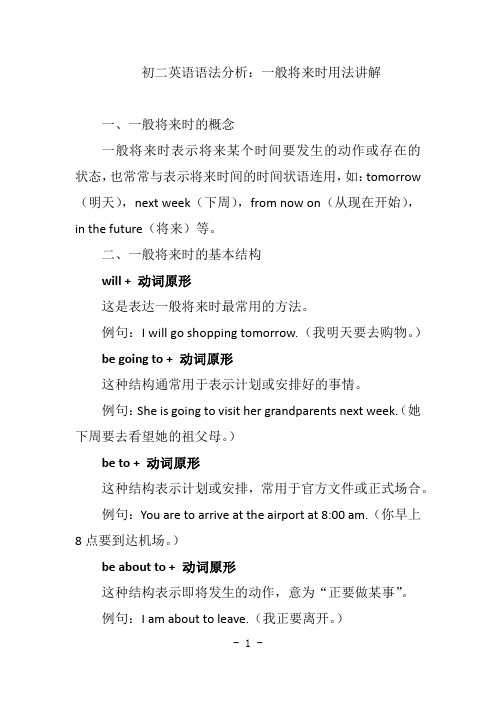
初二英语语法分析:一般将来时用法讲解一、一般将来时的概念一般将来时表示将来某个时间要发生的动作或存在的状态,也常常与表示将来时间的时间状语连用,如:tomorrow (明天),next week(下周),from now on(从现在开始),in the future(将来)等。
二、一般将来时的基本结构will + 动词原形这是表达一般将来时最常用的方法。
例句:I will go shopping tomorrow.(我明天要去购物。
)be going to + 动词原形这种结构通常用于表示计划或安排好的事情。
例句:She is going to visit her grandparents next week.(她下周要去看望她的祖父母。
)be to + 动词原形这种结构表示计划或安排,常用于官方文件或正式场合。
例句:You are to arrive at the airport at 8:00 am.(你早上8点要到达机场。
)be about to + 动词原形这种结构表示即将发生的动作,意为“正要做某事”。
例句:I am about to leave.(我正要离开。
)be due to + 动词原形这种结构表示某事预定或预期将要发生。
例句:The train is due to arrive at 5:00 pm.(火车预定下午5点到达。
)三、一般将来时的用法1表示将来的动作或状态例句:I will buy a new car next year.(明年我要买一辆新车。
)2表示将来的计划或安排例句:We are going to have a picnic this weekend.(我们这个周末要去野餐。
)3表示根据现有情况推测未来的可能性例句:It's going to rain soon.(很快就要下雨了。
)4表示命令、请求、建议等例句:You are to finish your homework before you go out.(你出去之前要把作业做完。
一般将来时讲解

一般将来时讲解一、概念:一般将来时表示将来某一时间的动作或状态,或将来某一段时间内经常的动作或状态。
常常和表示将来的时间状语连用。
如:tomorrow(明天),next week(下周);in the future(将来)等。
一般将来时由助动词shall(第一人称),will(第二、三人称)动词原形构成。
美国英语则不管什么人称,一律用will。
一般将来时基本句型肯定句:I / We shall / will go. You / He / She / They will go.否定句:I / We shall / will not go. You / He / She / They will not go.疑问句:Shall I / we go? Will you / he / she /t hey go?简略回答:Yes, 主语+ shall / will . / No, 主语+ shall / will not .特殊疑问句:一般将来时的特殊疑问句是将疑问词放在句首,后接一般疑问句(就主语提问时,以疑问词who开头的疑问词除外)--- Why will you be here on Sunday? ---I will have a meeting on Sunday.二、一般将来时结构1、will / shall + 动词原形这种结构一般单纯地表示将来某个时间将要发生的动作或存在的状态。
will用于各种人称; shall只用于第一人称。
例如:I will / shall go to visit him next week. 下周我将去拜访他。
What time shall we go there tomorrow? 明天我们几点去那儿?2、be going to 动词原形be going to 相当于一个助动词(其中be有人称和数的变化),与它后面的动词原形一起构成谓语。
用来表示近期将要发生的动作或存在的状态,以及计划、安排、打算要做的事。
一般将来时讲解
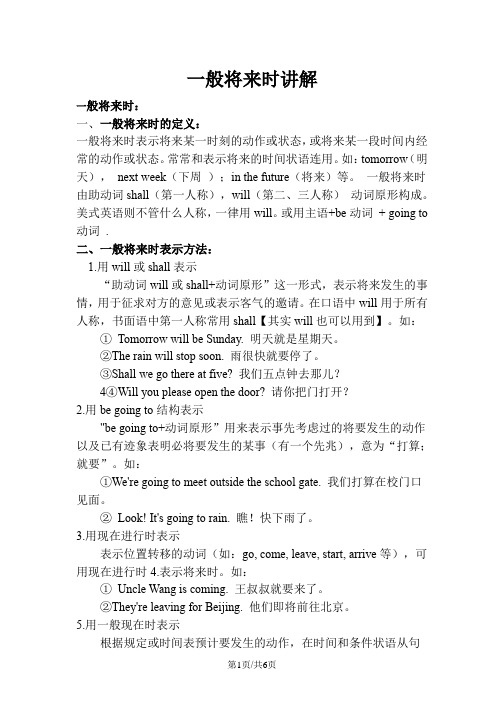
一般将来时讲解一般将来时:一、一般将来时的定义:一般将来时表示将来某一时刻的动作或状态,或将来某一段时间内经常的动作或状态。
常常和表示将来的时间状语连用。
如:tomorrow(明天),next week(下周);in the future(将来)等。
一般将来时由助动词shall(第一人称),will(第二、三人称)动词原形构成。
美式英语则不管什么人称,一律用will。
或用主语+be动词+ going to 动词.二、一般将来时表示方法:1.用will或shall表示“助动词will或shall+动词原形”这一形式,表示将来发生的事情,用于征求对方的意见或表示客气的邀请。
在口语中will用于所有人称,书面语中第一人称常用shall【其实will也可以用到】。
如:①Tomorrow will be Sunday. 明天就是星期天。
②The rain will stop soon. 雨很快就要停了。
③Shall we go there at five? 我们五点钟去那儿?4④Will you please open the door? 请你把门打开?2.用be going to结构表示"be going to+动词原形”用来表示事先考虑过的将要发生的动作以及已有迹象表明必将要发生的某事(有一个先兆),意为“打算;就要”。
如:①We're going to meet outside the school gate. 我们打算在校门口见面。
②Look! It's going to rain. 瞧!快下雨了。
3.用现在进行时表示表示位置转移的动词(如:go, come, leave, start, arrive等),可用现在进行时4.表示将来时。
如:①Uncle Wang is coming. 王叔叔就要来了。
②They're leaving for Beijing. 他们即将前往北京。
英语语法一般将来时的讲解
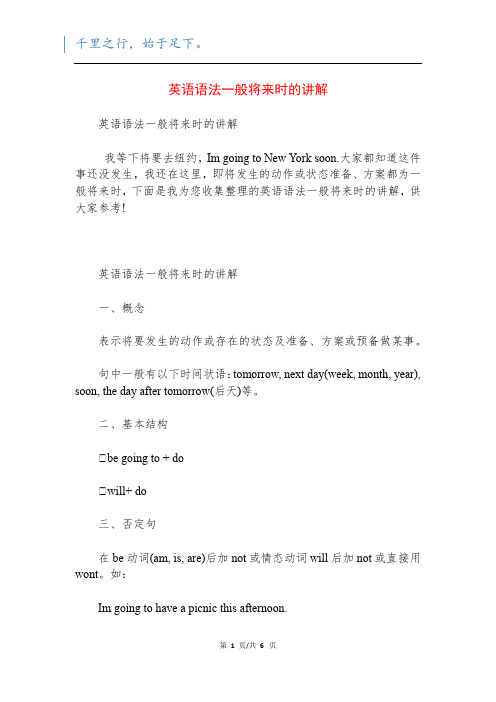
英语语法一般将来时的讲解英语语法一般将来时的讲解我等下将要去纽约,Im going to New York soon.大家都知道这件事还没发生,我还在这里,即将发生的动作或状态准备、方案都为一般将来时,下面是我为您收集整理的英语语法一般将来时的讲解,供大家参考!英语语法一般将来时的讲解一、概念表示将要发生的动作或存在的状态及准备、方案或预备做某事。
句中一般有以下时间状语:tomorrow, next day(week, month, year), soon, the day after tomorrow(后天)等。
二、基本结构①be going to + do①will+ do三、否定句在be动词(am, is, are)后加not或情态动词will后加not或直接用wont。
如:Im going to have a picnic this afternoon.Im not going to have a picnic this afternoon.I will go to have a picnic tomorrow.I will not/wont go to have a picnic tomorrow.四、一般疑问句be或will提到句首,some改为any, and改为or,第一二人称互换。
如:We are going to go on an outing this weekend.Are you going to go on an outing this weekend?五、对划线部分提问。
一般状况下,一般将来时的对划线部分有三种状况。
1. 问人。
Who 如:Im going to New York soon.Whos going to New York soon?2. 问干什么。
What 如:My father is going to watch a race with me this afternoon.What is your father going to do with you this afternoon?3. 问什么时候。
【初中英语】初中英语语法大全之一般将来时

【初中英语】初中英语语法大全之一般将来时【—之一般将来时】一般将来时表示将来某一时刻的将要发生动作或状态,或将来某一段时间内经常的动作或状态。
下面就是老师为同学们带来的对一般将来时的详细讲解,供同学们学习的参考。
总结顾名思义,通常将来时则表示将来某一时刻的将要出现动作或状态,或将来某一段时间内经常的动作或状态。
常常和则表示将来的时间状语属格,例如:tomorrow(明天),nextweek(下周),fromnowon(从现在已经开始);inthefuture(将来)等。
一、基本结构及用法1、will/shall+动词原形这种方法一般单纯地表示将来某个时间将要发生的动作或存在的状态。
will用于各种人称will常简略为'll,并与主语连写在一起,如:i'll,he'll,;shall只用于第一人称,在肯定句或否定句中表示将要或不会发生的事情或动作,在疑问句中可以表示建议或征求对方意见。
变否定句在will/shall后加not,缩略形式为won't;变疑问句把will/shall提到主语前。
比如:iwill/shallgotovisithimnextweek.下周我将回去造访他。
whattimeshallwegotheretomorrow?明天我们几点去那儿?2、begoingto动词原形(否定句、疑问句的变化彰显在be动词上)1)表示计划、打算、准备做的事。
比如:wearegoingtoputupabuildinghere.我们急于在这里砌一座楼。
howareyougoingtospendyourholidays?假期你准备怎样过?2)则表示即将出现或确实必须出现的事。
例如:ithinkitisgoingtosnow.我看要下雪了。
3、用现在展开时则表示常见考法对于通常将来时的考查,多以单选、句型切换或词语运用的形式考查学生在具体内容语境中灵活运用时态的能力。
在考试中,可以使大家推论与否该用通常将来时,以及如何恰当采用。
一般将来时态讲解
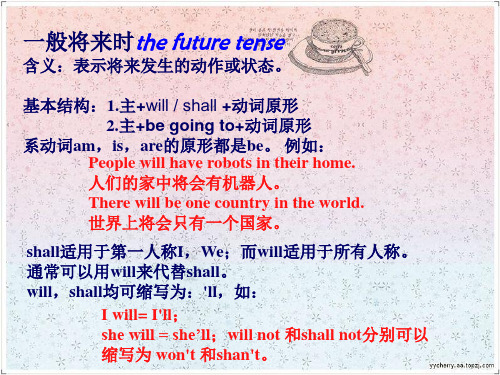
1. Do you want a job at Village Paints?
Please talk to ____u__s____ on Monday.
Marie and me
2. Give __h_im___ an umbrella. It’s raining.
Mr. Loyola
3. This coffee is cold. Please bring __h_e_r___some hot coffee.
Beijing at eleven.
4.一般将来时的常用结构
• ①用于“I expect, I‘m sure, I think, I wonder + 宾语从句”中
• Don't worry about the exam. I'm sure you'll pass.
• 不要担心这次考试,我确信你会通过的。
6.He will be
(be) back in three hours.
7.We will send (send) for a doctor if
you
are
(be) not better in the evening.
• 3.其他一般将来时态结构
• 1.现在进行时表将来(be + doing) • 表示某个按最近的计划或安排即将要进行的动作,an arrangement
• That bag looks heavy. I'll help you with it. • I won't tell anyone what happened, I
promise. • ④表示一种倾向或推测 • Flowers will die without water. • Water will change into ice at 0℃. • This will be your sister, I guess.
(简单)小学一般将来时讲解
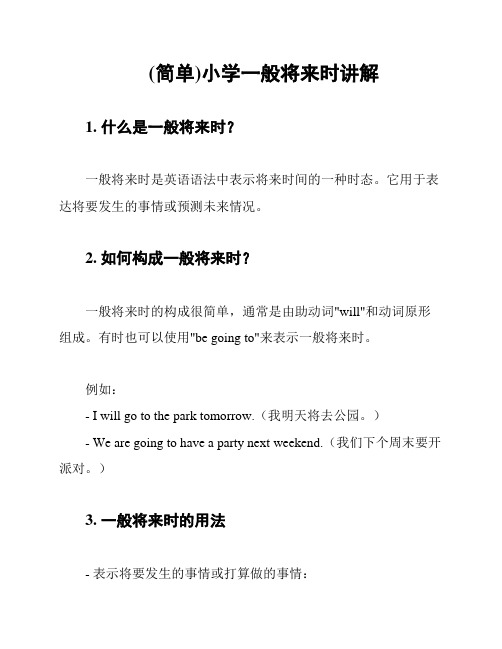
(简单)小学一般将来时讲解1. 什么是一般将来时?一般将来时是英语语法中表示将来时间的一种时态。
它用于表达将要发生的事情或预测未来情况。
2. 如何构成一般将来时?一般将来时的构成很简单,通常是由助动词"will"和动词原形组成。
有时也可以使用"be going to"来表示一般将来时。
例如:- I will go to the park tomorrow.(我明天将去公园。
)- We are going to have a party next weekend.(我们下个周末要开派对。
)3. 一般将来时的用法- 表示将要发生的事情或打算做的事情:- I will call you later.(我等会儿给你打电话。
)- They will have a meeting tomorrow.(他们明天要开会。
)- 表示预测或猜测未来情况:- It will rain this afternoon.(今天下午会下雨。
)- She will probably pass the exam.(她很可能会通过考试。
)- 用于表示意愿、请求、建议、命令等:- Will you help me with my homework, please?(请你帮我做作业好吗?)- You will do as I say.(你要按我说的去做。
)4. 注意事项- 一般将来时通常不能与表示明确的时间状语连用,如"tomorrow"、"next week"等。
- 在第一人称中,可以使用"shall"代替"will",但这在现代英语中很少使用。
- 使用"be going to"时,一般是根据现有迹象进行预测或计划。
5. 例句- She will study abroad next year.(她明年将出国留学。
一般将来时讲解(附习题+答案)

一般将来时讲解(附习题+答案)一、一般将来时的含义:表示动作发生在将来二、一般将来时的句型:(1) will/shall+动词原形(2) be going to+动词原形三、一般将来时的时间状语:tomorrow(明天)、the day after tomorrow(后天)、next...(下一...): next week(下一周)、next year(明年)、next month(下个月)in+一段时间(...之后): in three days(三天之后)、in the future在未来this evening(今天晚上)四、一般将来时的句型结构:(1) will/shall+动词原形(will not =won’t)(will 各种人称均可用,shall 只能用于第一人称)1)肯定句:主语+will/shall+动词原型...如:I will go to school tomorrow.我明天将会去学校He will go to school tomorrow.他明天将会去学校。
2)否定句:主语+will/shall+not+动词原型...如:I won’t go to school tomorrow.我明天将不会去学校。
He won’t go to school tomorrow.他明天将不会去学校。
3)一般疑问句:Will/Shall +主语+动词原型...如:Will you go to school tomorrow?你明天要去学校吗?Will he go to school tomorrow?他明天要去学校吗?肯定回答:Yes, 主语+will.如:Yes, I will.Yes, he will.否定回答:No,主语+will+not.如:No, I won’t.No, he won’t.4) 特殊疑问句:特殊疑问词+will/shall+主语+动词原型...如:What will you do tomorrow?你明天将会做什么?What will he do tomorrow?他明天将会做什么?(2) be going to+动词原形1)肯定句:主语+be going to +动词原型...如:I am going to buy some books tomorrow.我明天打算去买一些书。
初中英语一般将来时详细讲解

初中英语一般将来时讲解初中英语一般将来时(Simple Future Tense)用于表示将来某个时间会发生的动作或存在的状态。
下面是初中英语一般将来时的详细讲解:一、构成:1.一般将来时的肯定句结构为:主语 + will + 动词原形2.一般将来时的否定句结构为:主语 + will not (won't) + 动词原形3.一般将来时的疑问句结构为:Will + 主语 + 动词原形?二、用法:1. 表示未来的事实、计划或打算:①I will visit my grandparents next week.(我下周会去看望我的祖父母。
)②We will have a party on Saturday.(我们周六要开个派对。
)2. 表示预测或推测:①It will rain tomorrow.(明天会下雨。
)②He will probably be late for the meeting.(他可能会迟到会议。
)3. 表示意愿、请求、建议等:①Will you please help me with my homework?(你能帮我做作业吗?)②I will do my best to help you.(我会尽力帮助你。
)4. 表示承诺或威胁:①I will always love you.(我会永远爱你。
)②If you don't listen to me, I will tell the teacher.(如果你不听我的话,我会告诉老师。
)注意事项:1. 在一般将来时中,主语通常是第一人称(I/we)或第三人称(he/she/it/they),而第二人称(you)在肯定句和否定句中都是一样的。
2. 一般将来时的疑问句需要将助动词will放在句首。
3. 在一般将来时中,表示将来时间的副词或时间状语可以与will连用,如tomorrow, next week等。
三、总结:初中英语一般将来时用于表示未来某个时间会发生的动作或存在的状态,可以用于表达事实、计划、预测、意愿、请求等。
初中英语一般将来时态讲解
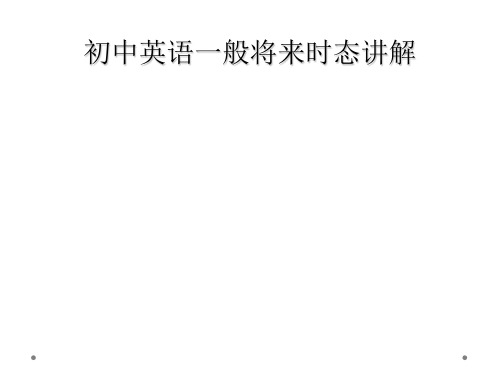
2、否定式
I shall not go to Europe next week. 下周我将不会去欧洲。 Lisa won’t be back in a few days. 丽莎几天后还不会回来。
3、一般疑问式
A: Will you go to Europe next week B: Yes, I will. B: No, I won’t. A: Will Lisa be back in a few days B: Yes, she will. B: No, she won’t.
不久后 before long a moment later
将来 in the future 明天早上 tomorrow morning
一小时后 one hour later in an hour
• be going to+动词原形
1、表示现在的意图,即打算在最近或 不久的将来做某事。
We are going to ask him. 我们打算问他。 What are you going to do tonight 你今晚打算做什么?
表示将要发生的动作或情况。如:
明天将会下雨。
It will rain tomorrow.
他将在下周一到达。
He will arrive next Monday.
我将永远不会忘记它。
I shall never forget it.
下次 next time 明天 tomorrow 明年 next year 今天下午 this afternoon 后天 the day after tomorrow
2、表示现在已有迹象表明即将 发生某事。
Look, it’s going to rain.
一般将来时的结构和用法及讲解
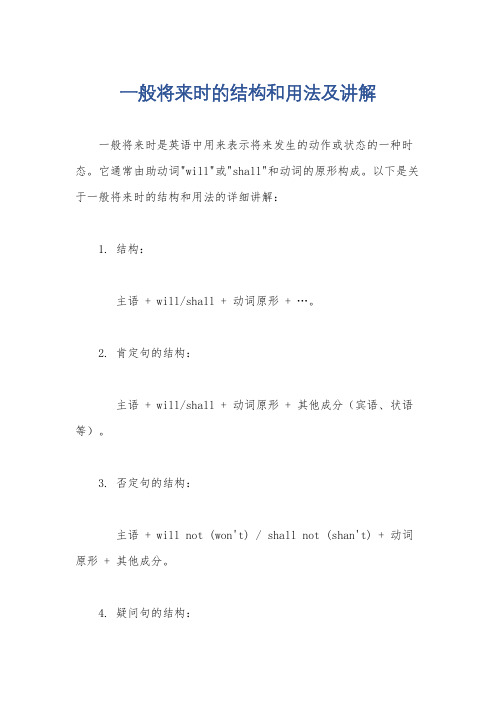
一般将来时的结构和用法及讲解一般将来时是英语中用来表示将来发生的动作或状态的一种时态。
它通常由助动词"will"或"shall"和动词的原形构成。
以下是关于一般将来时的结构和用法的详细讲解:1. 结构:主语 + will/shall + 动词原形+ …。
2. 肯定句的结构:主语 + will/shall + 动词原形 + 其他成分(宾语、状语等)。
3. 否定句的结构:主语 + will not (won't) / shall not (shan't) + 动词原形 + 其他成分。
4. 疑问句的结构:Will/Shall + 主语 + 动词原形 + 其他成分?5. 用法:a. 表示未来的事实、计划或意图,例如,“I will call you later.”(我稍后会给你打电话。
)。
b. 表示预测或假设,例如,“It will rain tomorrow.”(明天会下雨。
)。
c. 表示意愿、请求或承诺,例如,“I will help you with your homework.”(我会帮你做作业。
)。
d. 表示决定,例如,“I will buy a new car.”(我决定买辆新车。
)。
一般将来时的用法相对灵活,可以根据语境和需要进行灵活运用。
需要注意的是,一般将来时中的助动词"will"在口语中常缩写为"‘ll",而否定形式则缩写为"won't"。
同时,在一般将来时中,shall通常用于第一人称(I 和 we),而will则用于其他人称。
在现代英语中,shall的使用已经相对较少,通常用will来表示一般将来时。
英语一般将来时讲解
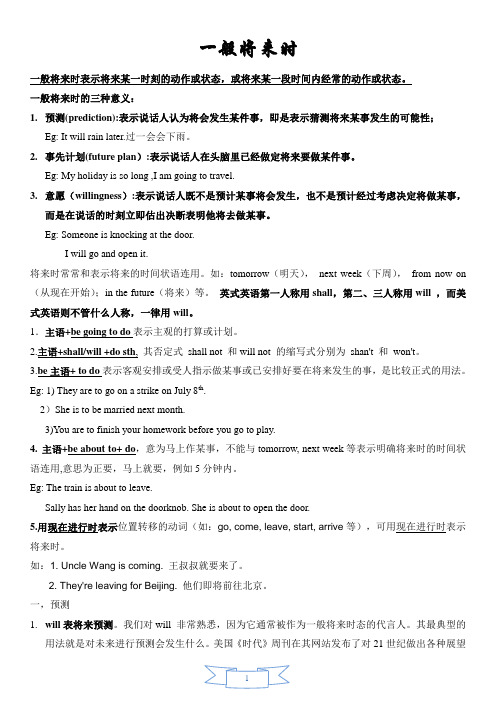
一般将来时一般将来时表示将来某一时刻的动作或状态,或将来某一段时间内经常的动作或状态。
一般将来时的三种意义:1.预测(prediction):表示说话人认为将会发生某件事,即是表示猜测将来某事发生的可能性;Eg: It will rain later.过一会会下雨。
2.事先计划(future plan):表示说话人在头脑里已经做定将来要做某件事。
Eg: My holiday is so long ,I am going to travel.3.意愿(willingness):表示说话人既不是预计某事将会发生,也不是预计经过考虑决定将做某事,而是在说话的时刻立即估出决断表明他将去做某事。
Eg: Someone is knocking at the door.I will go and open it.将来时常常和表示将来的时间状语连用。
如:tomorrow(明天),next week(下周),from now on (从现在开始);in the future(将来)等。
英式英语第一人称用shall,第二、三人称用will ,而美式英语则不管什么人称,一律用will。
1.主语+be going to do表示主观的打算或计划。
2.主语+shall/will +do sth, 其否定式shall not 和will not 的缩写式分别为shan't 和won't。
3.be主语+ to do表示客观安排或受人指示做某事或已安排好要在将来发生的事,是比较正式的用法。
Eg: 1) They are to go on a strike on July 8th.2)She is to be married next month.3)You are to finish your homework before you go to play.4.主语+be about to+ do,意为马上作某事,不能与tomorrow, next week等表示明确将来时的时间状语连用,意思为正要,马上就要,例如5分钟内。
(完整word版)一般将来时态讲解及练习和答案

1、概述一般将来时表示将来某个时间要发生的动作或存在的状态,常与表示将来的时间状语连用,如tomorrow,next week,next year等。
Why don’t you put the meat in the fridge? It will stay fresh for several days.为什么不把肉放在冰箱里?它可以保鲜好几天。
—You’ve left the light on。
你忘了关灯了。
- Oh , so I have。
I'll go and turn it off。
噢,那我马上去关.2、构成一般将来时由“助动词will/shall+动词原形”构成。
will用于第二、三人称,shall第一人称。
在口语中,will在名词或代词后常缩写为’ll,will not简缩为won’t[wount]。
但在美国英语中,各种人称皆可用will。
He will help his sister with her lessons。
他将帮助他妹妹做功课.We won’t be free this afternoon.今天下午我们没空。
3、一般将来时的用法(1)表示未来的动作或存在状态,常与表示将来的时间状语连用,如tomorrow, next Sunday, soon,in a month, in the future等。
We shall leave for London next Monday.我们将在下周一去伦敦。
He will come to see you the day after tomorrow.后天他要来看你。
You will be 20 next year。
明年你就二十了。
(2)表示将来反复发生的动作或习惯性动作We shall come and work in this factory every year.我们将每年来这工厂参加劳动。
The students will have five English classes per week this term.本学期学生每周将要上五节英语课。
英语一般将来时讲解

英语一般将来时讲解1.句型结构①助动词will / shall + 动词原形一般将来时表示将来要发生的动作或存在的状态,常与表示将来的时间状语tomorrow,next time,in the future,in+时间段,soon等连用,其结构为“will/shall+动词原形”。
其中will可用于各种人称;shall主要用于第一人称的句子中,尤其是在疑问句中,当主语为第一人称时,通常用shall。
例如They will go swimming tomorrow.Where shall we go for our holidays?②be going to+动词原形“be going to+动词原形”表示将要发生的动作或安排、打算,或有某种迹象表明即将发生某事。
③其他可表示将来的时态:(1)现在进行时可表示计划或准备要做的事;(2)一般现在时可表示按计划要发生的事。
例如:The Smiths are going shopping tomorrow.The final bus leaves at 7:00 p.m.2.一般疑问句: Will + 主语 + 其他?肯定句:Yes , 主语 + will.否定句: No, 主语 + won’t.例如:Will they have more time?肯定句: Yes, they will.否定句: No, they won’t.6. there be句型的一般将来时: There will be ……表示“将有……”。
例如:There will be more cars in the future.3. there 句型的肯否定句there be是原形;表示某处有某物there will be、there is going to be是there be句型一般将来时的表现形式。
例如:There is going to be a concert tomorrow.There are going to be two new zoos built next week.肯定句:There + will be + 其他否定句: There + won't be. + 其他一般疑问句:Will + there+ be + 其他?回答:Yes, there will. / No, there won’t. 例如:There will be more food.。
(完整word)一般将来时讲解
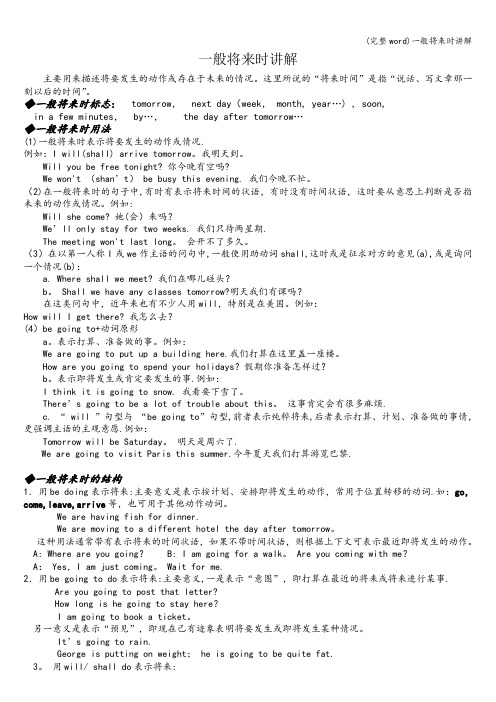
一般将来时讲解主要用来描述将要发生的动作或存在于未来的情况。
这里所说的“将来时间”是指“说话、写文章那一刻以后的时间”。
◆一般将来时标志: tomorrow, next day(week,month, year…) , soon,in a few minutes,by…, the day after tomorrow…◆一般将来时用法(1)一般将来时表示将要发生的动作或情况.例如:I will(shall) arrive tomorrow。
我明天到。
Will you be free tonight? 你今晚有空吗?We won't (shan’t) be busy this evening. 我们今晚不忙。
(2)在一般将来时的句子中,有时有表示将来时间的状语,有时没有时间状语,这时要从意思上判断是否指未来的动作或情况。
例如:Will she come? 她(会)来吗?We’ll only stay for two weeks. 我们只待两星期.The meeting won't last long。
会开不了多久。
(3)在以第一人称I或we作主语的问句中,一般使用助动词shall,这时或是征求对方的意见(a),或是询问一个情况(b):a. Where shall we meet? 我们在哪儿碰头?b。
Shall we have any classes tomorrow?明天我们有课吗?在这类问句中,近年来也有不少人用will,特别是在美国。
例如:How will I get there? 我怎么去?(4)be going to+动词原形a。
表示打算、准备做的事。
例如:We are going to put up a building here.我们打算在这里盖一座楼。
How are you going to spend your holidays?假期你准备怎样过?b。
表示即将发生或肯定要发生的事.例如:I think it is going to snow. 我看要下雪了。
- 1、下载文档前请自行甄别文档内容的完整性,平台不提供额外的编辑、内容补充、找答案等附加服务。
- 2、"仅部分预览"的文档,不可在线预览部分如存在完整性等问题,可反馈申请退款(可完整预览的文档不适用该条件!)。
- 3、如文档侵犯您的权益,请联系客服反馈,我们会尽快为您处理(人工客服工作时间:9:00-18:30)。
一般将来时讲解一般将来时:一、一般将来时的定义:一般将来时表示将来某一时刻的动作或状态,或将来某一段时间内经常的动作或状态。
常常和表示将来的时间状语连用。
如:tomorrow(明天),next week(下周);in the future(将来)等。
一般将来时由助动词shall(第一人称),will (第二、三人称)动词原形构成。
美式英语则不管什么人称,一律用will。
或用主语+be动词+ going to 动词.二、一般将来时表示方法:1.用will或shall表示“助动词will或shall+动词原形”这一形式,表示将来发生的事情,用于征求对方的意见或表示客气的邀请。
在口语中will用于所有人称,书面语中第一人称常用shall【其实will也可以用到】。
如:①Tomorrow will be Sunday. 明天就是星期天。
②The rain will stop soon. 雨很快就要停了。
③Shall we go there at five? 我们五点钟去那儿?4④Will you please open the door? 请你把门打开?2.用be going to结构表示"be going to+动词原形”用来表示事先考虑过的将要发生的动作以及已有迹象表明必将要发生的某事(有一个先兆),意为“打算;就要”。
如:①We're going to meet outside the school gate. 我们打算在校门口见面。
②Look! It's going to rain. 瞧!快下雨了。
3.用现在进行时表示表示位置转移的动词(如:go,come,leave,start,arrive等),可用现在进行时4.表示将来时。
如:①Uncle Wang is coming. 王叔叔就要来了。
②They're leaving for Beijing. 他们即将前往北京。
5.用一般现在时表示根据规定或时间表预计要发生的动作,在时间和条件状语从句中,都可用一6.般现在时表示将来时。
如:①The new term starts (begins) on August 29th. 新学期八月二十九日开学。
②If it doesn't rain tomorrow,we will go out for a picnic. 如果明天不下雨,我们将出去野餐。
7.用“be+动词不定式”或用“be about to +动词原形”的结构表示如:①He is to visit Japan next year.明年他将访问日本。
②They're about to leave. (=They're leaving.) 他们就要走了。
三、一般将来时的常见结构(一)常见结构1. will / shall + 动词原形(否定句在will/shall后加not)这种方法一般单纯地表示将来某个时间将要发生的动作或存在的状态。
will用于各种人称;shall只用于第一人称。
例如:I will / shall go to visit him next week. 下周我将去拜访他。
What time shall we go there tomorrow? 明天我们几点去那儿?2. be going to+动词原形be going to 相当于一个助动词(其中be有人称和数的变化),与它后面的动词原形一起构成谓语。
用来表示将要发生的动作以及计划、安排和打算要做的事。
例如:There is going to be a football match this afternoon.今天下午将有一场足球赛。
I‘m going to go to the park. 我将要去公园。
(二)常用结构1. 用于"I expect,I'm sure,I think,I wonder等的宾语从句"中。
Don't worry about the exam. I'm sure you'll pass.不要担心这次考试,我确信你会通过的。
2. 用于祈使句和陈述句中。
Work hard and you will succeed.如果你努力,就会成功的。
3.与表示时间或条件的状语从句连用。
I'll let you know as soon as he arrives.他一到我就通知你(四)基本结构1.主语+will/shall+动词原形2.主语+am/is/are+about+to+动词原形3.主语+am/is/are+to+动词原形4.主语+am/is/are+现在分词5.主语+am/is/are+going to+动词原形注:之所以不用be是因为这是一般将来时,而be还包括过去式的was、were一般将来时练习:一.填空My brother ______ (go) to Shanghai next week.Mary ________ (see) her grandfather tomorrow.David ________ (fly) kites in the park this weekend.I_______ (make) a plan for English study in three days.Who _______ (be) going to learn a new song next Tuesday?_______ (be) you going to Beijing tomorrow?We _______ (not be) going to have lunch at 12:00 tomorrow.8. Where _______ you _______ (leave) for tomorrow?9._______ Tom _______ (have) a P.E. lesson next Monday?10. What _______ they _______ (watch) in thegym tomorrow?11.what _____ they _______( do ) tomorrow ?12.The boy _______( not have ) an English lesson tomorrow .13.________ you _______( learn ) Chinese next week ?14.I ________ ( arrive ) there tomorrow .15.Mike _________ ( not watch ) a movie tomorrow .二.选择填空1. ( ) She is going to ________ after school.A. listening to musicB. listens to musicC. listen to musicD. listened to music2. ( ) We _______ in Beijing in two days.A. will arrivesB. arrivesC. are going to arriveD. arriving3. ( )The students ________ dumplings tomorrow.A. is going to makeingB. are makingC. will makeD. are make4. ( ) Are you going to_________ thirteen years old next year?A. will beB. areC. beD. go5. ( ) ___will see a play in 5 days?A. WhenB. WhatC. WhoD. Whose6. ( ) Mary______ English next year.A. will learnB. will to learnC. are going to learn.D. learns7. ( ) He’ll _____ shopping this afternoon.A. goingB. goC. goesD. went8. ( ) Will you ____ at the bus stop at 10:30?A. meetingB. meetsC. meetD. met9. ( ) Lily and I _______ the guitar. next week.A. am going to playB. are going to playC. will playsD. play10. ( ) How ______ Jenny ___ home tomorrow?A. does......goB. is……goingC. will……goD. do……go11. ( ) Who is going to _________ a song ?A. sings B singing C. to sing D. sing我国古代的读书人,从上学之日起,就日诵不辍,一般在几年内就能识记几千个汉字,熟记几百篇文章,写出的诗文也是字斟句酌,琅琅上口,成为满腹经纶的文人。
为什么在现代化教学的今天,我们念了十几年书的高中毕业生甚至大学生,竟提起作文就头疼,写不出像样的文章呢?吕叔湘先生早在1978年就尖锐地提出:“中小学语文教学效果差,中学语文毕业生语文水平低,……十几年上课总时数是9160课时,语文是2749课时,恰好是30%,十年的时间,二千七百多课时,用来学本国语文,却是大多数不过关,岂非咄咄怪事!”寻根究底,其主要原因就是腹中无物。
特别是写议论文,初中水平以上的学生都知道议论文的“三要素”是论点、论据、论证,也通晓议论文的基本结构:提出问题――分析问题――解决问题,但真正动起笔来就犯难了。
知道“是这样”,就是讲不出“为什么”。
根本原因还是无“米”下“锅”。
于是便翻开作文集锦之类的书大段抄起来,抄人家的名言警句,抄人家的事例,不参考作文书就很难写出像样的文章。
所以,词汇贫乏、内容空洞、千篇一律便成了中学生作文的通病。
要解决这个问题,不能单在布局谋篇等写作技方面下功夫,必须认识到“死记硬背”的重要性,让学生积累足够的“米”。
12. ( ) I _________in Beijing in three days.A. are going to arriveB. arriveC. will arriveD. arrives13. ( ) He _______some model planes tomorrow .A. going to makeB. is makingC. will make D makes14. ( ) Are you going to ___________a doctor next year ?A. will beB.. areC. beD. are going to15. ( ) She ________ you make supper this evening .A. helpsB. will helpC. is helpingD. is going help三、按要求改写句子1.The girls will draw pictures.否定句:____________________________一般疑问句:_________________________肯定回答:__________________________否定回答:__________________________对“draw pictures”提问:__________________________2.Kate and Jane are going to see a film.否定句:____________________________一般疑问句:_________________________肯定回答:__________________________否定回答:__________________________四、( )1. My father______ill yesterday.A. isn't B. aren't C. wasn't D. weren't ( )2.______your parents at home last week﹖A. Is B. Was C. Are D. Were( )3. The twins______in Dalian last year. They______here now. A. are; were B. were; are C. was; are D. were; was ( )4.______your father at work the day_____yesterday(前天)﹖ A. Was; before B. Is; before C. Was; after D. Is; after ( )5.—Who was on duty last Friday﹖—______.A. I am B. I was C. Yes, I was D. No, I wasn't五、根据中文意思完成句子1. 我下周要去伦敦。
